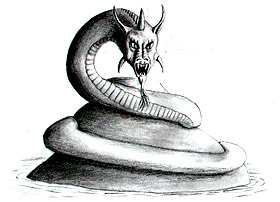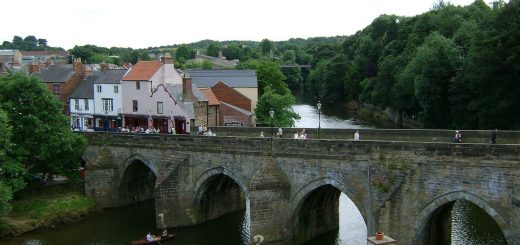Grayrigg Hall
There is an interesting piece of folklore relating to a curse connected to an early Quaker named Francis Howgill (born 1618 – died 1669) and Grayrigg Hall, ancestral home of the Duckett family. Grayrigg Hall (sometimes shown as Graridge Hall, Graridg Hall, Grariggehall, Grarigg Hall on old maps) has been described as a mediaeval fortified manor house and could be found on the outskirts of Grayrigg village. It eventually fell into disuse and was in ruins by the mid 18th century. (The current building known as Grayrigg Hall is not on the site of the original and can be found on the lane beside the church).
 The following account appeared in The Haunted Homes and Family Traditions of Great Britain by John Ingram (1897). He quoted his sources as Sir George Floyd Duckett’s Duchetiana (1874) which is described as ‘historical and genealogical memoirs of the family of Duket, from the Norman conquest to the present time’ and also The Life of Francis Howgill by James Backhouse (1828).
The following account appeared in The Haunted Homes and Family Traditions of Great Britain by John Ingram (1897). He quoted his sources as Sir George Floyd Duckett’s Duchetiana (1874) which is described as ‘historical and genealogical memoirs of the family of Duket, from the Norman conquest to the present time’ and also The Life of Francis Howgill by James Backhouse (1828).
‘Francis Howgill, a noted member of the Society of Friends, resided at Todthorne, near Grayrigg, in Westmoreland, about the middle of the seventeenth centurv. At one time he travelled about the south of England preaching, and when he visited Bristol, in company with his compatriot, John Camm (born Camsgill, near Kendal 1604 – died 1656), his preaching was made the occasion of great rioting.’
The Bristol incident took place around 1654. Just prior to this Howgill and Camm had visited London to start a Quaker Society and gain the support of Oliver Cromwell who gave them no encouragement. Bristol received the Quakers favourably and their meetings were well attended (with 3000 recorded attending one). The riots were incited by the local clergy and the mayor and magistrates issued a warrant for the Quakers arrest accusing them of being disguised Franciscans (Catholics).
In 1663 he returned to his own neighbourhood, whither his reputation had apparently preceded him, for, upon arriving at the market-place of Kendal, he was summoned to appear before the Justices, who were holding a court in a tavern. They tendered Howgill the oath of allegiance when he came before them, and as he refused to take it they committed him to confinement in Appleby jail. It may be pointed out, as a matter of history, that in the earliest days of the brotherhood, members of the Society of Friends were often subjected to severe penalties and much persecution for their refusal to conform to the taking of judicial oaths. At Appleby the judges of Assizes also tendered Howgill the same oath and, on his refusal to swear it, ordered him to be indicted at the next Assizes. Meanwhile they offered to release him from custody if he would give a bond for his good behaviour in the interim, but this he refused to do, and therefore was re-committed to prison.
During his imprisonment a curious incident happened. Howgill was allowed by the magistrates to go home to Grayrigg for a few days on private affairs, and in the course of the time he was at liberty the Quaker felt himself compelled to visit a justice of the name of Duckett, residing at Grayrigg Hall, who was a great persecutor of the Quakers, and was, also, one of the magistrates concerned in committing him to prison. Francis Howgill, on this occasion, was accompanied by a friend who, over the initials ” J. D.” would appear to have left a written report of the interview. Justice Duckett expressed much surprise at seeing Howgill, and said to him, ” What is your wish now, Francis? I thought you had been in Appleby jail.” Howgill replied to this effect, “No, I am not, but I am come with a message from the Lord. Thou hast persecuted the Lord’s people, but His hand is now against thee, and He will send a blast upon all that thou hast, and thy name shall rot out of the earth, and this thy dwelling shall become desolate, and a habitation for owls and jackdaws.” When Howgill had delivered this message, the Justice trembled, and said, ” Francis, are you in earnest? ” To which Howgill responded, “Yes, I am in earnest, it is the word of the Lord to thee, and there are many now living who will see it.”
This prediction by the Quaker appears to have been remarkably fulfilled ; for, according to the testimony of James Wilson, who was a minister among the Friends, and who lived at one time at Grayrigg Foot, in Westmoreland, this Justice Duckett had several children, and all those children died without leaving any issue, whilst some of them came to poverty. James Wilson himself had repeatedly given alms at his door to a woman, the last of the Duckett family, who hegged her bread from door to door. Grayrigg Hall passed into the possession of the Lowther family, was dismantled, fell into ruins, and in 1777 little more than its extensive foundations were visible. After having long been the habitation of ” owls and jackdaws,” the ruins were entirely removed, and a farmhouse erected upon the site of the old Hall. And thus the Quaker’s curse was fulfilled.
The Duckett of the tale is Anthony Duckett, son of Sir Francis Duckett (died 24 October 1635). The manor of Grayrigg was sold to Sir John Lowther of Lowther by Anthony Duckett circa 1685.
Did Francis Howgill really have the ability to wield Gods power to his own will and thus curse Duckett? I think he probably thought he did, which says something about his character. According to The Beginnings of Quakerism, “Francis Howgill had felt himself led to take a lame boy by the hand, and bid him, in the power of God that raised Jesus from the dead, to stand up and walk. He had written to Fox* in much perplexity because the attempted miracle had failed.”
* George Fox (born July 1624 – died 13 January 1691) founder of the Quakers.




Re: Grayrigg Hall
One of the founders of the Society of Friends cursing a whole family? Is it me or is that somewhat unfriendly?